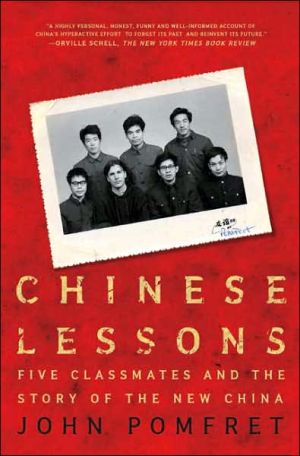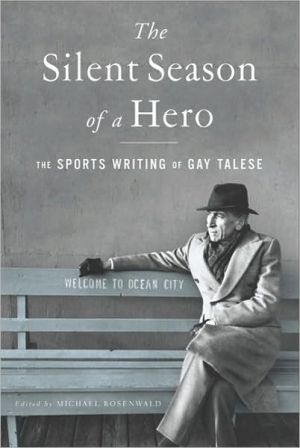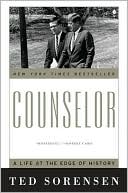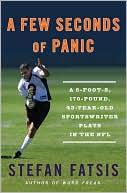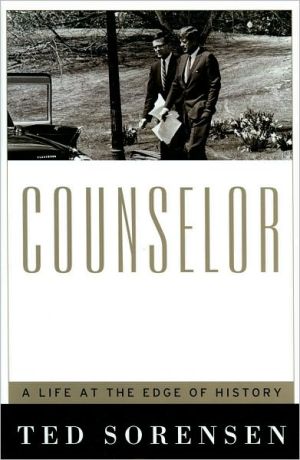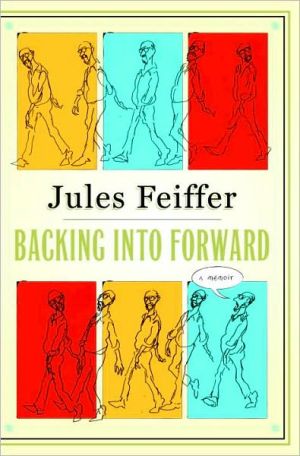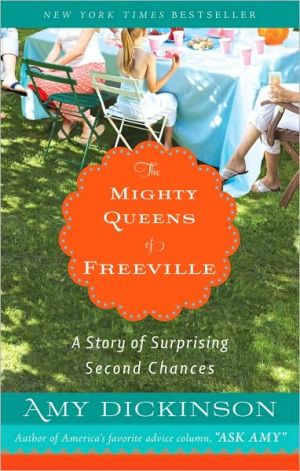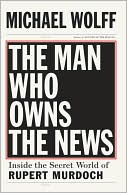Chinese Lessons: Five Classmates and the Story of the New China
A first-hand account of the remarkable transformation of China over the past forty years as seen through the life of an award-winning journalist and his four Chinese classmates\ As a twenty-year-old exchange student from Stanford University, John Pomfret spent a year at Nanjing University in China. His fellow classmates were among those who survived the twin tragedies of Mao’s rule—the Great Leap Forward and the Cultural Revolution—and whose success in government and private industry today...
Search in google:
A book about contemporary China. The New York Times - William Grimes [Pomfret] loves China, and he excels at describing the minutiae that make up Chinese life: the slang, the food, the bathrooms and the explosion of nouveau-riche bad taste in the boom towns and shopping districts. He makes an engaging, expert guide to the changes that have transformed China in the last quarter-century.
Chapter One\ Warmly Welcome You\ At six o'clock in the morning of February 3, 1981, I awoke with a start to the sounds of drums, trumpets, and the squawk of a woman telling me in Chinese to "increase vigilance, protect the motherland, and prepare for war!"\ This woman would hound me for the next year, her disembodied voice blasting out of a tinny speaker dangling by a wire just far enough from the bottom bunk that I could not disable it with a broom, yet close enough to wreck my mornings. And not just mine. She was China's daily national wake-up call, broadcast across the country, with the same clanging music and panicky martial message.\ Around me, seven Chinese men, ranging in age from eighteen to mid-thirties, all dressed in blue long-sleeved T-shirts and long johns, rustled out of their cotton bedding. As if on cue, they sent up a chorus of phlegmy hocks. Some spat on the floor; others into white enamel teacups. One by one, they slipped on flip-flops, grabbed their metal washbasins, yanked filthy washrags from a jerry-rigged clothesline stretched across the room, and shuffled off to the public bathroom to elbow out a space at a trough of cold water.\ I lolled in bed, slowly unfolding my six-foot-two frame from the chin-to-knees position I had to assume to sleep on a five-foot-ten bed. Above me my bunkmate, Xu Ruiqing, lounged, too. Xu (pronounced shoe) was the eldest in our room, a thirty-two-year-old Communist Party functionary from a little city sixty miles east of Nanjing. His formal title was Secretary of the Communist Party Committee of the Students Majoring in History, Nanjing University, Class of 1982—a lot of words that meant he could linger in bed if he wanted, too. Like me and the others in the room, Xu was an undergraduate student, but he had special duties: determining who would get a shot at membership in the ruling Communist Party, and keeping tabs on his fellow students, me included, for any signs of wayward behavior.\ I surveyed the room, a dark box with cement floors and dingy whitewashed walls, half the size of my bedroom at my folks' apartment in Manhattan. Crammed against the walls were four bunk beds with gunmetal frames and rice-husk mattresses. The lumpy pillows were also stuffed with rice husks that would stab through the thin cotton cover. Our bedrolls, still in heaps, would soon be folded with military precision. Tacked on the walls were snapshots from home, typically the family arrayed solemnly around their most valuable possession, more often than not a clunky radio.\ Eight wooden desks were shoved together in the center of the room, each desk matched with a stool. At head-height, my roommates had strung three wire clotheslines. Wet laundry, scabrous underwear, holey T-shirts, and faded Mao jackets drooped from the wires. From my bottom bunk in the purple darkness of early morning, the lines resembled mountain ridges stretching off into the distance.\ The whole scene, lit by two naked low-watt bulbs, looked more like a work camp than university student housing—The Grapes of Wrath goes Asian. The only nod to modernity was taped on the wall near my pillow: a picture of New York's skyline and the skull and roses of the Grateful Dead.\ I had arrived in China in September 1980 after completing my third year at Stanford University. The United States had established diplomatic relations with China only a year earlier, though contacts between the two countries had intensified beginning in 1971, when Henry Kissinger, then the national security adviser, made a secret trip to Beijing as part of President Richard Nixon's plan to thaw the decades-old cold war with the Communist nation. The two powers then united in a secret and ultimately successful campaign, involving intelligence sharing and gunrunning to rebels in Afghanistan and other Third World hotspots, with the goal of entombing their shared enemy: the Soviet Union.\ You'd never guess it from the bare-bones surroundings of my dorm room, but I considered myself lucky to be in China. I'd started to study modern Chinese history and the Chinese language at a time when China was terra incognita. As a twenty-one-year-old American exchange student, I had won a front-row seat at what I thought was going to be the greatest show on Earth: the reemergence of China on the world scene after four decades of self-imposed isolation. Being a student offered opportunities not available to Western diplomats, businessmen, or journalists for the simple reason that the Chinese government didn't much care about us foreign college kids. We could move around more freely, have closer contact with the locals, and, as a result, get a better idea of what it was like to be Chinese.\ I had first experienced China through my belly. As a child, Chinese food was one of the first cuisines I was willing to eat outside of hamburgers. I remember, as a nine-year-old during the Vietnam War demonstrations of 1968, hearing students at Columbia University shouting, "Mao, Mao, Chairman Mao!" As I got older, my interest expanded to Chinese history and current events. But I never bought into the notion, then voguish on U.S. campuses, that Mao Zedong had created a worker-peasant paradise in China. My father, a journalist for the New York Times before becoming an executive at the company, had imbued in me early the ideas that government is not to be trusted, and that revolutions inevitably crush their own.\ By my junior year at Stanford, I had chosen to major in East Asian Studies and had committed myself to finding a way to get to China. At the time, just a handful of Chinese universities had programs for exchange students, and most of those were summer courses. I wanted to go for a year or more.\ Through a friend, I contacted a Chinese-American professor working at Stanford's linear accelerator who agreed to write a letter on my behalf to his former classmate, the dean of the Beijing Languages Institute. My plan was first to study language in Beijing and then apply to a Chinese university. In December 1979, I received a letter from the People's Republic, written on rice paper in the curlicued script of a bygone era, with a postage stamp of a monkey-king cavorting on a cloud. "Dear Friend Pomfret, Salutations!" it began and went on to inform me that I would be welcome to begin studies at the institute the following September. I had learned my first lesson in how things were accomplished in the People's Republic—through connections. The same principle applied to getting my Chinese visa. The Chinese consulate in San Francisco had not received notification of my acceptance to the Beijing Languages Institute. I waited for months, exchanging a stack of letters with the school, until my father came to my rescue. A Times editor put him in touch with a Chinese diplomat, Cao Guisheng, who years later would be identified as a top Chinese intelligence officer. Cao agreed to help and in August 1980, I picked up my visa at the Chinese consulate in San Francisco. That first brush with a Chinese spy would not be my last.\ Before leaving California, I dropped in at the Asian Languages Department at Stanford. One of my Chinese professors pointed his finger at me and said, "You are going to China. Do you have a Chinese name?" It had never occurred to me that John Pomfret would not work perfectly well in China. The Chinese language, made up of about four hundred monosyllables (compared to English's eight thousand), is woefully limited when it comes to transliterating foreign words and names. The closest one could come to my name would be something like: "Yue-Han [John] Pang-Fu-Lei-Te [Pomfret]."\ My professor chose Pan as my new surname. Like my name, it started with P. There are only a few hundred last names for all 1.3 billion Chinese, and so it would be that whenever I met a Chinese with the last name Pan, he or she would invariably joke that we were from the same mythical ancestral village. For a given name, the professor chose Aiwen, from Edwin, my middle name. Aiwen means "lover of culture." Pan Aiwen. I thought it was cool. Only later would I learn that Lover of Culture was a girl's name, the Chinese equivalent of, say, Petunia.\ In 1980, there were no flights between the United States and China. The way in was through British colonial Hong Kong, the plane swooping for a landing over the tenements that ringed Kai Tak Airport. The next morning I boarded a train for the first leg of my trip to Guangzhou, formerly known as Canton, the largest city in southern China. After an hour, we arrived at the listless border town of Lowu, the last stop in Hong Kong. Lugging three suitcases and a backpack, I walked over a bridge crossing the fetid Shenzhen River into China.\ In 1980, Shenzhen was a network of villages dotted with rice paddies and fishponds, with a population of 280,000. Its tallest building was five stories high; its workers and farmers each produced on average $250 worth of goods each year. A year earlier, the Chinese government had picked Shenzhen as the first of its five so-called Special Economic Zones, where experiments with capitalist-style economic reforms would soon unlock the pent-up moneymaking talents of one of the world's most entrepreneurial peoples.\ Once on Chinese soil, I transferred to a train for Guangzhou. The Shenzhen station seethed with travelers hauling merchandise—clothes, canned food, bales of rice—in sacks attached to bamboo shoulder poles that bent under the weight of the load. The scene was a two-tone riot of navy blue and olive green, the color of almost all clothing worn in China. Men with wild eyes and Mao caps surged on board. Absent the Mao cap, I looked pretty much the same.\ As a foreigner, I had been placed in first class, where the fans worked, clean white lace antimacassars adorned the seatbacks, and attendants delivered thermoses of boiling water and lidded teacups. The rest of the long train was third class, what the Chinese aptly call "hard seat," where hundreds of sweating, smoking travelers crammed together on benches.\ The train clanked past bamboo groves, duck ponds, and village houses blackened by coal dust. I saw men steering wooden plows pulled by water buffalo, women hunkered over knee-deep in rice paddy water, and travelers tottering on clunky black bicycles along dirt paths. This was a view of rural southern China I would come to know well, and one I believed would be everlasting.\ After dumping my suitcases at one of the few Guangzhou hotels that catered to foreigners, I went off in search of food. All I had was an address of a famed restaurant and a bad street map. I trudged for hours, getting caught in a downpour, before finding shelter under the awning of a teahouse alongside several couples, all of whom were holding hands. That was interesting; I'd been told that public displays of affection were banned.\ As late afternoon approached, families cascaded out from narrow doorways into the streets for dinner, squatting on tiny stools, rice bowl in one hand, chopsticks in the other, shoveling food into their mouths. By the time I found the restaurant, it was teeming with diners. All heads turned toward me, the sweat-stained foreigner. My Chinese was pretty primitive, so I walked table to table with a waitress, pointing to what I wanted to eat. What's that? Snake. And that? Owl. And that? Civet cat.\ In my college Chinese textbooks, by chapter three, we had learned "vanguard of the proletariat" and "serve the people," but we never did learn how to say "I'd like General Tso's Civet Cat, please." I chose a plate of shredded chicken with bell peppers, some green vegetables, and a steamed fish, downing it all along with four bowls of rice and an indeterminate quantity of warm flat beer served in bowls. Diners from neighboring tables, their faces scarlet with drink, staggered over to toast this "American friend." That night I learned a new word: fantong, literally "rice bucket" or "big eater." To peals of laughter, I repeated it louder and louder. "I am a rice bucket. I am rice bucket." Later on I learned it also meant "dummy."\ The next evening, I boarded the train from Guangzhou to Beijing. Back in first class, I shared my berth with a Chinese official in a finely pressed Mao suit. I had brought a small cassette player, and I popped in a Bob Marley tape, explaining in broken Chinese, "This is the music of revolution." Thinking this would earn me some solidarity, I was surprised when he seemed to recoil in horror at the word. I thought he had misunderstood, so I reformulated the sentence. "This is revolutionary music." Again, he looked at me oddly, as if in dismay. After four decades of non-stop political struggle, revolution was probably the farthest thing from his mind.\ I wandered back to the hard sleeper cars with their rack-upon-rack of three-level padded black bunks crammed with families and young people. A group of students heading to the university in Beijing asked me to sit down and share some sunflower seeds. A few tried out their halting English on me, as I did my Chinese on them. They, too, had no interest in Bob Marley. They favored the Eagles' greatest hits, until the train police appeared and told me to go back to first class and my new friends scattered with embarrassed smiles.\ As the train chugged north toward Beijing, the air grew cooler, the skies brighter. I developed my first crush on a Chinese woman—a train attendant who made fun of my bad Chinese and harangued me for being left-handed. Both would become routine—the crushes and the teasing I took about the way I spoke their language and manhandled their chopsticks. The landscape out the window changed from tropical rolling hills to flatter, drier plains of yellow dirt. We lumbered through the industrial heartland of Wuhan, crossing the Yangtze River, and then half a day later we left the muddy waters of the Yellow River behind as well. At dawn on the third day we began our approach to Beijing.\ Once in Beijing, I made my way, via a rattling Russian-made taxi, from the railroad station to the Beijing Languages Institute, on the northwestern outskirts of town. On the way we passed an enormous square. The driver turned to look at me: "This is Tiananmen!" he shouted, spraying me in his enthusiasm with a mouthful of spittle. I asked him to drive around it once so I could take in the view and the enormous painted portrait of Mao that dominated its northern side.\ With their victory over the Nationalists in 1949, the Communists moved the capital from Nanjing to Beijing. They flattened Beijing's old city walls and bulldozed the courtyard houses and shantytown that stretched for a mile in front of the crimson gates of the Forbidden City, for centuries the residence of China's emperors, empresses, and their eunuch aides and courtesans. In place of the shantytown, they paved a four-million-square-foot rectangle; it was called Tiananmen, the Gate of Heavenly Peace. After an hour's drive, the driver deposited me at the school. I dragged my stuff past a series of gatekeepers and under the nose of a twenty-five-foot-tall Mao statue, freckled with coal dust.\ The first thing that struck me about Beijing was the vastness of the sky. Hazy blue, it floated above the city in marked contrast to the grayness below—the worn and tired people with their sullen faces, green army trucks, dirty stone houses, and omnipresent propaganda posters. Though Beijing was one of the largest cities in the world, no skyscrapers speared its immensity. The autumn winds were crisp and dry from the north and east, and carried sand and leaves. I learned fast to wrap my head in a scarf before heading out the door.\ Half of the students at the institute were foreigners studying Chinese: Italian Communists, Pakistanis seeking secrets to China's A-bomb, Iranians and Iraqis (they fought continuously), white-robed Arabs, French intellectuals who walked around carrying ashtrays, Germans with their Karl Marx-wannabe beards, Americans who crooned Motown loudly and off-key in the common showers, and hundreds of Africans, many of them in forced exile. The rest of the students were Chinese, studying a Babel of foreign languages, from English to Bulgarian.\ Most of the Chinese hoped to study overseas. That fall I edited fifteen college applications on behalf of my new Chinese friends to Harvard, Yale, Dartmouth, University of Chicago, Columbia, and Stanford. The applications were hand-carried to Hong Kong and mailed there to avoid censors, spies, and jealous colleagues who with a word could derail the plans of a lifetime.\ The personal statements I transcribed were my first inklings of the toll exacted on ordinary Chinese by the Cultural Revolution, when Chairman Mao shut high schools and universities and declared war on educated Chinese. As youngsters, these students had secretly nurtured ambitions that were not only lofty but outright illegal. They were brave, a bit reckless even, steeled by miserable childhoods. All were familiar with political repression, mostly as victims, occasionally as perpetrators, and sometimes both. Their lives, so devoted to books in the beginning of the 1980s, were, in fact, tinged in blood. Competition for a university place in 1977, when they had tested into the institute, was the most intense it ever had been and ever would be in Communist China's history. For each spot at a liberal arts college in China, there were sixty-seven test takers.\ Kuang Da, a brilliant linguist, had spent six years in a shoe factory. Zhang Hua, a willowy southern girl with eyes as big as walnuts, had witnessed the beating death of her father and then watched Red Guards push her brother out a third-story window, crippling him. Wang Kegang, with movie star looks, had planted wheat for three years. Wang's personal statement described the transformation of an idealistic boy, who worshiped Chairman Mao, into a hardened young man. "I have a scientific outlook on life," he wrote, that taught him "people's desire for power, money and comfort are boundless. I see the meanness in life. Never again will I allow myself to be cheated by charismatic preaching or political superstition. I will let none of this stop me as I seek my goal." He could have been writing for his whole generation.\ The American universities ate these stories up, starting an educational love affair that would see more than three hundred thousand Chinese study in the United States, often on scholarships, over the next several decades. Kuang ended up going to the University of Chicago; Wang to Yale; Zhang to Smith. Wang even spent a summer with my parents, working the quintessential American immigrant job—running rides and taking tickets on Coney Island.\ My first impression of the Chinese at the Beijing Languages Institute was how skinny they were. Foreigners studying at the institute were not allowed to live with Chinese, so for me the best way to meet them was to play pickup basketball, introduced to China in 1896 by American missionaries. Despite its imperialist pedigree, Mao loved basketball; it was the only Western sport not banned during the Cultural Revolution.\ Courtside, the Chinese students would peel off layer after layer of clothes; a blue or green Mao jacket, a brownish gray sweater, an off-color white shirt that hadn't been washed in days. Finally, a thin, blue long-sleeve cotton sweatshirt came off to reveal the bony body, all ribs and elbows. They wrapped their belts two, sometimes three, times around their sylphlike waists. Caloric intake in China in the early 1980s was at the same level as it was in the 1930s. Although greatly improved from the decades immediately following the 1949 revolution, the Chinese diet was almost devoid of protein and fat. Perpetually hungry, my friends would jostle in line for access to the best dishes in the dining hall, wolfing down the glop in seconds.\ As my first semester drew to a close in December 1980, the institute conducted a singing contest for the Chinese students, foreshadowing the karaoke craze that would sweep the country a decade later. One group of students, dressed in overalls, strumming guitars and banging soda bottles together for rhythm, sang the old minstrel favorite "Plantation Boy." In the middle of the song, a waiflike woman minced up to the mike and, swaying like a Hollywood starlet of the 1940s, tempted the audience with Beijing's very tame version of a come-hither look. Their pitch was perfect, even though they were tone-deaf to the song's racist connotations. Another group of students penned their own lyrics to the tune of a Chinese propaganda ditty, "Study Hard!"\ Everyday there is nothing Nothing to go after at all Except soy bean milk and onion pancakes on Wednesday morning But then 20 people cut in line Our classes are ridiculous We must study on our own Maybe tomorrow things will change\ The party member judges did not approve. First prize went to a group of straitlaced students in Mao jackets singing "Jingle Bells."\ As my Chinese improved and I met more people from within the institute and beyond, I was struck by the deep hostility toward foreigners among Chinese in authority. There was a lot of talk of friendship but very little to be found. My minder at the institute, a diminutive Maoist named Mr. Bi, read my mail and monitored my contacts with Chinese students. The watchman at our dorm forced Chinese visitors to write down their names and addresses, which were then handed over to security personnel. Politically, it was much safer for Chinese to be hostile than to be friendly. Those brave enough to talk to foreigners were often treated harshly and criticized by fellow Chinese, yet they still took incredible risks just to meet me. Not that I was particularly special, but to them I embodied something—a carefree life and access to a freer world—that many of them wanted.\ One evening I found myself in Beijing's tiny downtown at a dance in the Beijing International Club, where elderly tourists from the American Midwest mixed with the elite Chinese who had the connections to get past the guard at the door. I had come with Wang to celebrate his admission into Yale. As I boogied to the Clash, Wang sidled up to me. "I want to be like you," he squealed, hugging me impulsively on the dance floor. Nearby, security service agents clumsily snapped their flash cameras, documenting the faces of the partying Chinese.\ Another evening, I was strolling out the door of my all-male, all-foreign student dormitory when a Chinese girl entered. The gatekeeper burst out of his little room by the door. "You shouldn't be here," he screamed, the veins bulging in his neck. The girl stared steadily at him and kept walking. He made a note in his log and went back to his pipe and his radio. A week later, I learned that the girl, a friend of an African student, had disappeared.\ Daily life for me in China was that of a zoo animal. The fact that I used my body more than my hands on a basketball court, had a large nose, and slept naked became subjects of conversation. This last habit was of special interest because, as I learned first in public baths and later with roommates, Chinese would employ the skills of a contortionist to avoid exposing their private parts. One American woman spent a year rooming with a Chinese woman and never saw her legs above her knee.\ Cultural clashes occurred nonstop; we called them "China moments." One day in the fall, I was invited to a friend's apartment for dinner. When I arrived, the night guard stopped me and told a blatant lie: my friend was not in. There was no way to call because people had no phones, and I couldn't scale the brick walls because they were too high. I erupted at the gatekeeper, mangling my Chinese in a fit of futile histrionics.\ "I get angry here," I wrote in a letter home to my parents, "a weird almost uncontrollable rage, a rage that makes me want to break up restaurants, push people, scream and yell, smack into people on my bicycle as they cross the street with their heads down."\ For pocket change, I landed a job teaching English at a computer institute for sixty dollars per month, not as bad as it sounds when you consider that a meal of twenty fried pork dumplings cost less than a dollar. My students were in various stages of patching together their lives following the Cultural Revolution. One of them, Liu Bin, lived by the school gates in a one-room brick shack with a packed mud floor and a corrugated tin roof secured by cement blocks. On occasion, he would invite me to his house, where his wife would cook Moo Shu Pork and other northern specialties. We ate around a folding table, two people on stools and one on the bed. I didn't realize until later that it was costing them upwards of a month's salary to feed us, and that each time I was invited, Liu had to receive permission in advance from the Communist Party secretary at his workplace.\ At Liu's home, I would play with his six-year-old daughter and listen to his stories of being deported during the Cultural Revolution to grow wheat on a farm near the Russian border. Liu hated the Communists and felt that he had lost half of his forty-two years to the vagaries of their destructive political campaigns. A man in a hurry, he was fueled by a ferocious anger and the conviction that he was a victim owed his due.\ Copyright © 2007 by John Pomfret. All rights reserved.
Sent DownWarmly Welcome You 3The Slap 17Broken Wing 26Father's Lessons 35Black Bricks 42A Meat Pie from Heaven 51Lovers and ComradesBitter Love 63Party Animal 73Outside the Gates 79New Street Crossing 96A Handful of Bran 102Spiritual Pollution 112Petrified Marriage 116Yin Finds Yang 1241989Crossed Paths 137Show Me the Money 144To the Barricades 149Asylum 165Fishy Handshakes 169Into the SeaFake Foreign Devils 177Killing the Chickens 182White Like Mother's Milk 186Rice Bowl Christians 194Yes Man 201Homecoming 209The Adman 215The China Price 221Spiritual Civilization 228Gods and Animals 234Sprinting Toward Little ComfortsPine on a Cliff 243Endure 251Crawling Home 261The Enthusiasms of High Altitude 270Severe and Acute 277High Tides 282Thugs' Revolution 287My Place in the Procession 292Conclusion: The Chinese Dream 296Acknowledgments 302Credits 303Index 304
\ William Grimes[Pomfret] loves China, and he excels at describing the minutiae that make up Chinese life: the slang, the food, the bathrooms and the explosion of nouveau-riche bad taste in the boom towns and shopping districts. He makes an engaging, expert guide to the changes that have transformed China in the last quarter-century.\ — The New York Times\ \ \ \ \ Karl Taro GreenfeldChinese Lessons is a rich, first-hand account of modern Chinese history as it was lived and experienced by five of the author's 1981 classmates at Nanjing University. Pomfret was among the first generation of American college students to enroll in exchange programs with Chinese universities in the early 1980s; the New York native grew up to become The Post's Beijing bureau chief and one of the very best reporters covering China throughout the dynamic 1990s, with his writings emerging as the standard by which many of his peers judged their own work. In his hands, the journey of his classmates becomes not just an entertaining and precisely rendered account of a changing China in which consumers' aspirations ratcheted up from bicycles and wrist watches to Audis and flip-phones; it also becomes a splendid human narrative of how fragile souls weather barbaric cruelty, social shifts and the rewiring of a nation.\ — The Washington Post\ \ \ Publishers WeeklyPomfret's first sojourn in China came as an American exchange student at Nanjing University in 1981, near the outset of China's limited reopening to the West and its halting, chaotic and momentous conversion from Maoist totalitarianism to police state capitalism and status as world economic giant. Over the next two decades, he returned twice as a professional journalist and was an eyewitness to the events at Tiananmen Square in 1989. Pomfret's enthusiasm and personal access make this an engaging examination of three tumultuous decades, rooted in the stories of classmates whose remarkable grit and harrowing experiences neatly epitomize the sexual and cultural transformations, and the economic ups and downs, of China since the 1960s. At the same time, Pomfret draws on intimate conversations and personal diaries to paint idiosyncratic portraits with a vivid, literary flair. Viewing China's version of capitalism as an anomoly, and focused overwhelmingly within its national borders, the book's lack of a greater critical context will be limiting for some. But Pomfret's palpable and pithy first-hand depiction of the New China offers a swift, elucidating introduction to its awesome energies and troubling contradictions. (Aug.) Copyright 2006 Reed Business Information.\ \ \ \ \ Library JournalPomfret (former Beijing bureau chief, Washington Post) left Stanford University in the early 1980s to study Chinese in one of China's leading universities. He stayed in touch with his Chinese classmates as they came of age, and like Peter Hessler in Oracle Bones: A Journey Between China's Past and Present, he deploys their individual stories and his own coming of age and immersion in Chinese culture to tell the larger story-almost as a memoir-of a China itself coming of age. His writing is steady and frank, wittily rueful over China's follies and his own, appreciative, and wonderfully readable. His long-term commitment to China affords insights into the contradictions of economic boom, social uncertainties, and a political system that, yes, is changing but probably not fast enough. [See Prepub Alert, LJ 5/15/06.] Copyright 2006 Reed Business Information.\ \ \ \ \ Kirkus ReviewsAmong the first Americans to study in China following the communist victory in 1949, Washington Post reporter Pomfret looks back at his student days at Nanjing University in 1981 and the lives of his classmates, survivors of one of the most tumultuous periods in the country's history. Readers numbed by the catalogue of crimes offered in Mao: The Unknown Story (2005), by Jung Chang and Jon Halliday, will find them evoked here with more personal applications to the lives of Big Bluffer Ye, Book Idiot Zhou, Little Guan, Old Xu and Daybreak Song. Don't be misled by their jaunty college nicknames. These are the children of the Great Leap Forward and the Cultural Revolution, convulsive political purges unleashed by Mao. They witnessed (and sometimes were forced to act as accomplices to) the humiliation, torture and even deaths of their own parents. Pomfret sketches each of the five as he remembers them from college, including as well the story of his own student days in a country still ill at ease with foreigners. It's his detailed reporting about their lives before and after graduation, however, that sets this book apart. While knowing that he can't fully comprehend China's tortuous history or its complete effect on his subjects, the author has immersed himself as much as any outsider can in all things Chinese, enabling him to assess each of his subjects with remarkable empathy. He plainly admires these former classmates, but he's clear-eyed about the peculiar ways in which each has been twisted by a tyrannous political system that 30 years ago put "capitalist roaders" to death and today declares that "to be rich is glorious." It's fascinating to see how each has negotiatedadulthood-love, family, work-in a country hurtling toward modernity under the Party's capricious whip hand. A moving account of individual experiences, indispensable to anyone seeking to understand the precarious national psyche of the world's most populous nation.\ \
